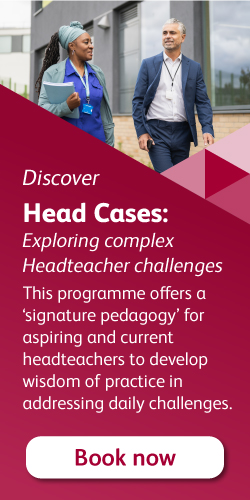
At the end of the 2023-24 academic year, we published the findings of our survey of 236 headteachers in our ‘Labouring to Love Headship’ report. The picture presented was gloomy around preparation, induction, training and support for those taking up headship. For example, 86% of those who mentioned NPQH concluded that it was insufficient preparation for the realities of the role.
In amongst these clouds, however, were the silver linings of ideas for how the situation might be improved. 91% of respondents agreed with research findings saying that the complexity of headship must be addressed by provision and 66% outlining that this might best take the form of programmes to address practical and operational challenges.
The challenge then, for training providers, is to provide what two of our respondents wanted: “a forum and a regular structured opportunity to reflect on headship” in which headteachers can get better at “dealing with the complexity of the role, being supportive and nurturing of others.”
For these reasons, we are delighted to be able to offer a programme designed to address these unmet needs for serving and aspiring headteachers. Drawing from the pragmatist insights of Lee Shulman’s work on teacher education, this programme seeks to use case studies of typical challenges headteachers are likely to face in their role. These ‘headteacher case conferences’, or ‘Head Cases’ as we have chosen to call them, will address the facets of the role that are felt to be the most intractable at times because they usually relate to managing competing goods and, as such, strong and often conflicting opinions between individuals and groups.
Details of the ‘Head Cases’ programme can be found on our website. In this blog, our aim is to explore the ways in which this case study approach can serve as a ‘signature pedagogy’ for school leaders. In doing so, it will draw from a range of Shulman’s papers.
Just in case (1996)
Lee Shulman was fascinated by the potential for cases within education because of his studies of professional learning within the medical and legal fields. For him, education needed to use case studies for developing “professional reasoning, professional discourse, and professional memory” (Shulman, 2004, p464). This latter point – professional memory – was of particular concern for a teaching profession in which multiple isolated decisions about similar situations isolates individuals and results in a sense of systemic professional amnesia.
Working with cases makes professional discourse memorable and, coupled with the power of principles, enmeshes theory and practice for the benefit of both. This criss-crossing of the theory/practice divide helps practitioners to be able to connect what they learn in one case to “numerous other instances” of similar – or even seemingly different – cases.
But what constitutes a good case for Shulman? One facet of importance is its plot, as cases draw upon narrative reasoning which may be the earliest educative technology invented by humankind by which to make sense of their world. To be effective, for Shulman the plot of a case study must concern plans gone awry, unfulfilled intentions and/or disruptive surprises.
The case is educative precisely because it is built around some sort of failure or surprise, requiring a comparison of intentions and outcomes and demanding either improvisational or deliberative responses to the problems. (Ibid, p469)
The plot of a case study therefore must include intention, chance, judgment and reflection. The thwarting of intention by chance enables those contemplating cases to consider other courses of action through thinking and reflecting upon the consequences of past and future actions. For Shulman, it is not experience alone that leads to learning, but thinking about experience.
This mode of thinking involves a lot of ‘re’ processes to mediate direct experience: re-collecting, re-telling, re-experiencing, re-flecting, The aim of analysing and extrapolating from a case is to answer the question ‘what is this a case of?’. This helps practitioners in making sense of their professional milieu directly through similar experiences and indirectly through consideration of the yet-to-be-experienced. Four different processes are at work for those putting cases together and considering them: enactment, narration, connection, abstraction.
Case conferences require professionals to be active, reflective, collaborative and community-building. The take-aways from case conferences for individual practitioners are that they help develop adaptability and the ability to cope with “variability, flux and change” through thinking with others about the “vicissitudes of intended practice” (ibid, p481).
The practical and the eclectic (1984) and Teaching along, learning together (1988)
In these papers, Shulman focuses more on the nature of a forum designed to make sense of the ‘cases’ that have been identified as being typical of professional challenges.
The dialectic between the theoretical and the practical…requires a forum, a setting within which the abstract and the concrete, the general and the particular, the intended and the observed, can be laid bare and scrutinised. (Shulman, 2004, p167).
Shulman’s lifelong commitment to collaborative professional learning comes to the fore, as he stresses the importance of competing views that require being held in creative tension. It is important for such a forum to include diverse, heterogeneous perspectives which include strong emotions that can be freely expressed. Only by connecting emotion and cognition, perspective and passion, and ideas and actions, can professionals hope to address challenge.
The cases brought to such a gathering need to be “prototypic” ones that are representative of the “broader field” so that those involved in making sense of the case can recognise something generalisable and applicable to their own experience of headship. Most importantly, the cases need to be “richly and thickly described” (ibid, p176); there is little to be gained from knocking over straw men for those genuinely wrestling with the complexity of problematic situations.
If this seems like a recipe for controversy, then all to the good as such controversies “are both inevitable and desirable” (ibid, p321). This is the natural form of human reasoning which, when it encounters the incompleteness of an argument (as indeed all arguments are incomplete), strives to oppose it to build on what was missing and deepen the analysis. Collegialism is, in this way, indispensable for both individual learning and educational reform more widely.
Theory, practice and the education of professionals (1998) and Calm seas, auspicious gales (2004)
As outlined earlier, Shulman is interested in the processes of professional judgment involved in navigating the boundaries of knowledge and its application in the “gritty particularities of situated practice” (ibid, p534). It is in this liminal space that human judgment is called upon and comes to the fore, in which the ideal and the feasible are negotiated. It requires of leaders the careful blending of the knowledge of the academy and the prudence of the fieldwork.
Shulman argues that the creation of ‘communities of practice’ are essential for making the most out of case studies. By transforming individual practice into shared narratives, we make it community property so that “distributed expertise can be shared, and standards of practice can evolve” (ibid, p537). The processes of a community of practice are thus beneficial for individuals and for the group, but also for the individuals-in-the-group, particularly around the norms of practice that are unambiguous on paper but all too ambiguous in practice.
This is important, especially for those new to professional roles, as they can learn to navigate…
…the moral sea of decisions to be made, actions to be taken. Options are rarely clean; judgments must be made. (ibid, p543)
This case study approach can serve to detoxify failure making it safer to learn from. Forgiving and remembering (not forgetting) ought to be the inspiration behind case conferences to safeguard not only the individual practitioner, but also the reasoning processes that broaden rather than narrow the field of professional practice in complex situations. Role complexity, when experienced in isolation from others, can be debilitating. In connection with a community of practice, however, it can be experienced as something empowering and liberating, enhancing individual autonomy.
The Wisdom of Practice (1987)
Enhancing the wisdom of practice was Shulman’s overarching goal in writing about case studies and case methods. It is, after all, the title given by Shulman to the collection curating the essays that underpins this blogpost. We have outlined three dimensions of this approach to enhancing the wisdom of practice for our forthcoming headteacher case conferences (or Head Cases).
- The cases discussed across the five sessions will be memorable and relevant, enabling the exploration of theory and practice. They will enable professional thinking through reflection upon narratives that are recognisable in their sense of surprised intention.
- The conferences will prioritise a dialectic approach. Diversity of viewpoint will be both anticipated and valued, with a recognition that differing views of the good are normal in leadership practice and help strengthen collegiality in thinking about practice.
- The combination of cases and conferences will be designed to model a community of practice. Our focus will be on exploring professional norms in the face of complex decision-making to enhance the wisdom of individual judgment by participants.
As Shulman puts it in his essay on ‘The Wisdom of Practice’:
The challenge is to get inside the heads of practitioners, to see the world as they see it, then to understand the manner in which experts construct their problem spaces, their definitions of the situation, thus permitting them to act as they do. (ibid, p257)
Head Cases: Exploring Complex Headteacher Challenges
This programme of webinars will use case study methods and Socratic dialogue to explore the complex practical and philosophical challenges facing headteachers.

